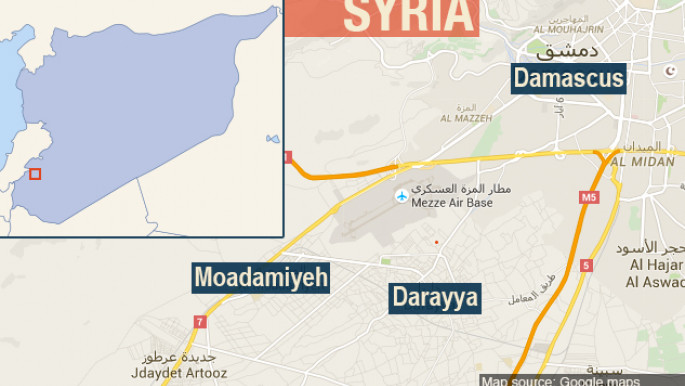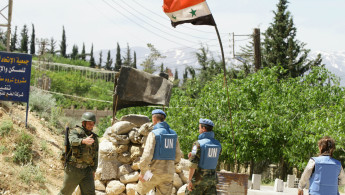Starved into accepting a 'political solution' in Syria
But following the announcement, many activists and doctors in Madaya remain sceptical over whether the convoy will materialise, and many insist that temporary aid relief can not be a long-term solution for besieged towns and cities.
On Thursday evening, the UN spokesperson for Syria told al-Mayadeen, a TV news channel supportive of Syrian President Bashar al-Assad, that aid entered Madaya two months ago, and it was enough to sustain the city during that time.
This is strongly disputed by local activists.
"In the past three months the aid to enter Madaya is 10 kilos of rice, four kilos of sugar, four kilos of bulgur, five kilos of Homs oil, some bean cans and two kilos of spaghetti," Abo Hassan, head of Madaya’s local council told The New Arab earlier this week.
"Not enough aid for one family to last more than ten days."
| Read more: Surrender or starve in besieged Syria |
"What Assad and the UN announced today was only to placate the world as a result of the huge media campaign," said Ahmed Moadamaini, representative of the Coordination Committees of Moadamiyeh, a town near Madaya also under siege.
"So far, the regime has only given a written statement, and has not given permission for the convoys to move. Preliminary information indicates that he will not allow aid to enter until next week," he said.
"If the United Nations is serious, we will already see convoys of aid now in the heart of Madaya."
These concerns are reflected by many in those parts of Syria that remain cut off and locked down by armed group - whether loyal to Assad or the opposition.
Following reports on Thursday that aid would be allowed to enter Madaya, the UK Syria solidarity campaign got in touch with aid workers and doctors in the area.
Dispelling rumours that aid had already arrived into the area, they urged food be permitted to enter now.
Brice de le Vingne, director of operations at Medicin San Frontieres, described the crisis as "a clear example of the consequences of using siege as a military strategy".
"As well as supplying food, an immediate medical evacuation of sick patients, and an urgent resupply of medicines is the only way to stave off a situation that is now catastrophic," he said.
Locals also emphasised said that the occasional aid convoy permitted by the Syrian government would not solve the root problem - that of the war waged on civilians by the regime, which has so far claimed the lives of at least 300,000 people.
The people of the cut-off areas have been suffering from bloody violence for the past five years, bombarded by barrel bombs and attacks from militia groups.
What frustrates them more, however, is the attitude of the UN and the Syrian Red Crescent, who they say are doing little to help their case.
Opposition media in Madaya even reported receiving only an out-of-office email from the UN when they asked for aid during the winter holidays.
Media activists and aid workers say they are in constant direct contact with UN and aid officials who are reportedly fully aware of the situation, but seem to have done little to help.
"No sane person can believe that the UN, which includes the world's superpowers, is not able to do something to lift this injustice and calamity," Ahmed told The New Arab.
"If the UN is not able to help the oppressed in the time of war, what use does it have in the time of peace?"
International aid groups and the UN are only permitted to work through "official channels" which, in Syria, remains the Assad government, not the local opposition councils.
Ahmed says that the last time support workers entered Moadamiyeh to give aid, they only distributed it to Assad supporters in the Eastern district.
"Some of them then sell on the food at an exorbitant price," he said.
Ahmed speculated that this may yet be a condition set by Damascus before further aid will be allowed into the area.
 |
Maybe they don't have many options, but quite frankly, today the street no longer trusts the United Nations |  |
Yet many feel that international organisations, such as the Red Crescent and the UN, could do more to stand up to the Assad government.
"Maybe they don't have many options, but quite frankly, today the street no longer trusts the United Nations and considers them partners in these crimes," said Ahmed.
Some the scepticism towards the UN further increased following the announcement of its December roadmap, backed by the US and Russia, to end the war in Syria.
The plan aimed to establish a "political solution" to the conflict with no clear stance on Assad being a part of the process. The Syrian opposition criticised the proposal as being "unrealistic" and insisted there was no future for Assad in Syria.
 |
|
"After all this misery, we are sure that the UN, in one way or another, doesn't want Assad to leave… so they do not make a move to stop this disaster taking place and to try him for war crimes," said Ahmed.
UN special envoy Staffan de Mistura said that the eventual political solution could be found with the help of "local ceasefires" which, it is argued, bring peace - albeit maybe temporary - to bombarded and besieged areas.
However, Syrians say that this forces them out of their homes and cities, and allows Assad to gain further ground in opposition-held regions.
The Assad regime has been issuing strongly worded threats to Moadamiyeh that the city will be annihilated if locals do not immediately evacuate, with sieges intended to put more pressure on locals to accept deals.
Mohammed Noor, another local activist, previously told The New Arab that he feels Moadamiyeh would be used as a "blueprint" for the remaining rebel-held areas in Syria if the regime manages to force its population to accept a deal.
However, despite facing starvation, residents are adamant they are not going anywhere.
"We would rather die honest and free than live in humiliation and slavery," said Ahmed.
Follow Imogen Lambert on Twitter: @InnogenLamb


![President Pezeshkian has denounced Israel's attacks on Lebanon [Getty]](/sites/default/files/styles/image_684x385/public/2173482924.jpeg?h=a5f2f23a&itok=q3evVtko)



 Follow the Middle East's top stories in English at The New Arab on Google News
Follow the Middle East's top stories in English at The New Arab on Google News


